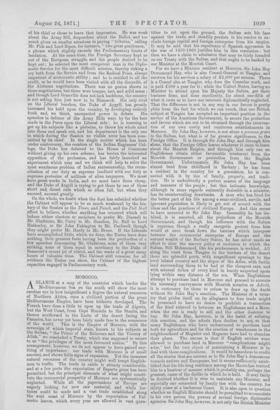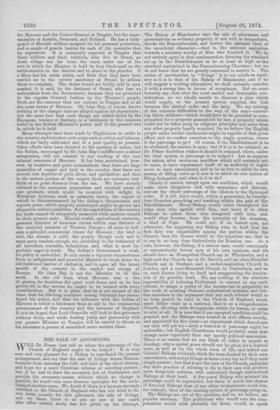MOROCCO.
AGLANCE at a map of the countries which border the Mediterranean Sea on the south will show the most careless eye in how insignificant a degree the natural resources of Northern Africa, once a civilized portion of the great Mediterranean Empire, have been hitherto developed. The French have done a little to open up the trade of Algeria, but the West Coast, from Cape Simonia to the Straits, and thence southward to the limits of the desert facing the Canaries, has never yet been fairly made free to the commerce of the world. This is the Empire of Morocco, with the sovereign of which imperial state, known to his subjects as the Sultan, " the Prince of the Believers and the Viceroy of Allah," we concluded a Treaty, which was supposed to secure to us " the privileges of the most favoured nation." By this arrangement, however, we do not appear to have gained any- thing of importance ; our trade with Morocco is of small amount, and shows little signs of expansion. Yet the immense natural resources of the country might well tempt English- men to traffic. The trade in cattle is already considerable, and at a few ports the exportation of Esparto grass has been permitted, but the principal elements of what might consti- tute the commercial prosperity of Morocco are systematically neglected. While all the papermakers of Europe are eagerly looking for new raw material, and while for- tunes could be made and a vast trade established along the west coast of Morocco by the exportation of Pal- metto leaves, which every year are allowed in vast quan- tities to rot upon the ground, the Sultan sets his face against the trade, and steadily persists in his resolve to ex- clude foreign capital and foreign enterprise from his empire. It may be said that his experience of Spanish aggression in the war of 1859-18G0 justifies him in this resolution ; but then we have a claim to admission that may be fairly founded on our Treaty with the Sultan, and that ought to be backed by our Minister at the Moorish Court.
For we have a Minister resident at Morocco, Sir John Hay Drummond Hay, who is also Consul-General at Tangier, and receives for his services a salary of £2,000 per annum. There is a Consul also at Tangier, who does the Consular work, and is paid £500 a year for it ; while the United States, having no Minister to attend upon his Majesty the Sultan, get their business done, and done excellently, for about one-fifth of what it costs us to have our interests diplomatically neglected. That the difference is not in any way in our favour is pretty plain from the fact for which we can vouch, that one British subject at Tangier has accepted an important position in the service of the American Government, to secure the protection and favour which are not to be obtained through the interven- tion of our own costly and cumbrous establishments in Morocco. Sir John Hay, how ever, is not alone a persona grata to the Sultan, but, what is of far greater significance, to the Foreign Office. It is through Sir John Hay, and through him alone, that the Foreign Office learns whatever it cares to learn about the Moorish Empire, and through him only can an Englishman obtain either favourable treatment from the Moorish Government or protection from the English Government. Unfortunately, Sir John Hay has been almost bred from childhood in Barbary ; he has been a resident in the country for a generation, he is con- nected with it by ties of family, property, and tradi- tion. He is undoubtedly a perfect master of the language and manners of the people ; but this intimate knowledge, although in some regards eminently desirable in a minister, has its countervailing drawbacks. A man who has lived for the better part of his life among a semi-civilized, servile, and ignorant population is likely to get out of accord with the ideas and the practices of civilized Europe. And this seems to have occurred to Sir John Hay. Insensibly he has im- bibed, it is asserted, all the prejudices of the Moorish Government, and though his influence with the Sultan is supreme, though a really energetic protest from him would at once break down the barriers which interpose between the commercial enterprise of Europe and the natural wealth of the Barbary States, he has never made an effort to alter the narrow policy of exclusion to which the Sultan, Sidi Mohammed, like his predecessors, is wedded. All along the coast from Tangier to the borders of the desert there are splendid ports, with magnificent openings to the level inland country and the slopes of the Atlas, with fertile land surrounding them to be had at the cheapest rate, and with mineral riches of every kind in barely suspected spots lying within easy distance of the sea. When Englishmen attempt to purchase land in Morocco and proceed to execute the necessary conveyances with Moorish notaries or Adools, it is customary for these to refuse to draw up the deeds without Sir John Hay's sanction. The Minister of a coun- try that prides itself on its allegiance to free trade might be presumed to have no desire to prohibit a transaction of the kind referred to between an Englishman and a Moor, when the one is ready to sell and the other desirous to buy. Sir John Hay, however, is in the habit of refusing this sanction, and the adools then decline to act, so that many Englishmen who have endeavoured to purchase land both for agriculture and for the erection of warehouses in the neighbourhood of Mogador and Magazan have had to abandon their plans. The excuse is that if English settlers were allowed to purchase land in Morocco " complications might arise," but the very object of maintaining a Minister is to deal with those complications. It would be hazardous to credit all the stories that are current as to Sir John Hay's demeanour towards natives and Europeans, but it seems sufficiently estab- lished that his life-long residence among the Moors has trained him to a hauteur of manner which is probably one, perhaps the greatest, cause of the dislike in which he is held. It may fairly be doubted whether it is wise to maintain any Minister, and especially one connected by family ties with the country, for thirty years at a barbarous Court. It is also open to question whether an English Minister should be permitted to accumulate in his own person the powers of several foreign diplomatic agencies. Sir John Hay, however, is not only the British Minister for Morocco and the Consul-General at Tangier, but the repre- sentative of Austria, Denmark, and Holland. He has a body- guard of Moorish soldiers assigned for his personal protection, and a couple of guards besides for each of the countries that he represents. It is commonly reported at Tangier that these soldiers and their relatives, who live at Swath, an Arab village not far from the coast, make use of the awe in which the Minister is held to levy black-mail on the cattle-stealers in the district and to share in the plunder. If a Moor has his cattle stolen, and finds that they have been carried on to the reivers' sanctuary at Swath, he seldom dares to complain. The stolen beasts are boldly sold in open market, it is said, by the denizens of Swani, who fear no molestation from the Government, because they are protected in the regular Oriental fashion by the Minister's people. Such are the rumours that are current in Tangier and in all the coast towns of Morocco. Sir John Hay, of course, knows nothing of the charges that are alleged against his dependents ; but the mere fact that such things are talked about by the European traders of Barbary, is a testimony to the common belief in the British Minister's power and to the general awe in which he is held.
Many attempts have been made by Englishmen to settle in the country,and introduce new crops, such as cotton and tobacco, which are badly cultivated and of a poor quality at present. Other efforts have been directed to the opening of mines, but the Sultan, encouraged by Sir John Hay's indifference or silent antagonism, will not consent to any working of the vast mineral resources of Morocco. It has been ascertained, how- ever, by tentative and quiet examinations that there are large quantities of copper and lead in the country, that there are several rich deposits of gold, silver, and quicksilver, and that in the eastern portion of the empire there are extensive coal- fields at no great distance from the sea. We have already referred to the enormous purposeless and criminal waste of raw products which would be received with delight in European factories, such as palmetto leaves, the export of which is discountenanced by the Sultan's Government, and esparto grass, which properly encouraged might be grown and shippedin tenfold quantities. But the capabilities of the country for trade cannot be adequately measured while matters remain in their present state. Mineral wealth, agricultural resources, pastoral districts of immense extent within easy distance of the crowded markets of Western Europe ; all seem to indi- cate a splendid commercial future for Morocco ; the land is rich, the climate is mild, the people, though rude and in some parts careless enough, aro, according to the testimony of all travellers, tractable, industrious, and, what is most im- portant, eager to trade. The Sultan's Government is weak, its policy is undecided. It only needs a vigorous remonstrance from an enlightened and powerful Minister to break down the old-fashioned barrier of exclusion, and to open all the latent wealth of the country to the capital and energy of Europe. Sir John Hay is not the Minister to do this work. In the old time, when Morocco was a den of pirates, he doubtless did good work there, and as he has grown old in the service ho ought to be treated with every consideration. But it is plain that he is not abreast of the time, that his life-long residence among Orientals has stereo- typed his policy, and that his influence with the Sultan of Morocco is rather a hindrance than an aid to the commercial advancement of the country and the interests of England. It is to be hoped that Lord Granville will look to this grievance without delay, and while dealing justly and generously with our present Minister at Tangier, will be careful to choose as his successor a person of somewhat more modern ideas.































 Previous page
Previous page